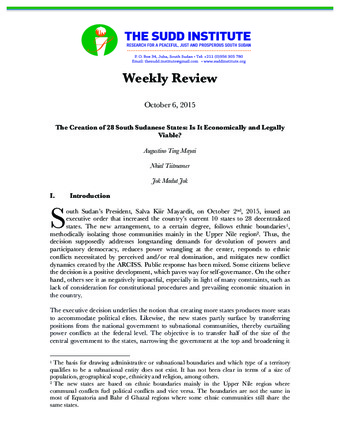The Creation of 28 South Sudanese States: Is It Economically and Legally Viable?

Authors: Jok Madut Jok, Nhial Tiitmamer, Augustino Ting Mayai
Organization: The Sudd Institute
Type: Weekly Reviews
Date: 06/10/2015
Publication Summary
South Sudan’s President, Salva Kiir Mayardit, on October 2nd, 2015, issued an executive order that increased the country’s current 10 states to 28 decentralized states. The new arrangement, to a certain degree, follows ethnic boundaries[1], methodically isolating those communities mainly in the Upper Nile region[2]. Thus, the decision supposedly addresses longstanding demands for devolution of powers and participatory democracy, reduces power wrangling at the center, responds to ethnic conflicts necessitated by perceived and/or real domination, and mitigates new conflict dynamics created by the ARCISS. Public response has been mixed. Some citizens believe the decision is a positive development, which paves way for self-governance. On the other hand, others see it as negatively impactful, especially in light of many constraints, such as lack of consideration for constitutional procedures and prevailing economic situation in the country.
The executive decision underlies the notion that creating more states produces more seats to accommodate political elites. Likewise, the new states partly surface by transferring positions from the national government to subnational communities, thereby curtailing power conflicts at the federal level. The objective is to transfer half of the size of the central government to the states, narrowing the government at the top and broadening it at the base. Advocates for the federal system are generally concerned with direct involvement of the governed, thus establishing additional subnational administrative units supposedly promotes participatory democracy. Ethnic conflicts, like political conflicts at the center, are equally seen as a product of current governance structures. South Sudan comprises over 60 ethnic communities. While ethnic diversity could be an incentive if well managed, the country is plagued by longstanding ethnic hostilities. At times, ethnic conflicts amplify political conflicts, hence ethnically fanned political violence. Ethnic federation, as is momentarily the practice in Ethiopia, may allow for cohesion in the country, the decision seems to suggest. Lastly, the new order attempts to preempt the new political dynamics the ARCISS has generated in the Upper Nile region, subjecting government supporters in Upper Nile and Unity states to the opposition’s rule. A new conflict could arise if the government supporters in those states do not buy the agreement. Expanding space for shared governance in the two areas, the government possibly discerns, could reduce future conflicts.
While some quarters of the South Sudanese population are celebrating as evident by public response, the procedure of the decision and its contradictions to the transitional constitution and the agreement for the resolution of conflict in South Sudan (ARCIS) are also being challenged. The rebel movement that Dr. Riek Machar commands, for example, has already expressed its disapproval of the new order, on these bases. A number of peace advocates have also expressed similar concerns.
In this weekly review, the Sudd Institute attempts to shed light on the expansion of states in South Sudan. The analysis looks at the driving factors behind the decision, implications in the context of economic viability, constitutionality, and timing of the decision. Our sense is that, although there are plausible merits to the creation of additional states, it could turn negative, depending on how the political stakeholders manage it. In the sections that follow, our analysis provides detailed discussions on the decision’s key motivations and implications.
Jok Madut Jok is trained in the anthropology of health and holds a Ph.D. from the University of California, Los Angeles (UCLA). He is a fellow of Rift Valley Institute and Director of the Sudd Institute. Jok has held fellowship positions at a number of other institutions, including the United States Institute of Peace and the Woodrow Wilson International Center for Scholars. He also served in the Government of South Sudan as undersecretary in the Ministry of Culture and Heritage for three years. He has also worked in aid and development and author of four books and numerous articles covering gender, sexuality and reproductive health, humanitarian aid, ethnography of political violence, gender-based violence, war and slavery, and the politics of identity in South Sudan and Sudan. His book Breaking Sudan: The Search for Peace, was published in 2017 by OneWorld.
Nhial Tiitmamer has served as the Director of the Environment and Natural Resources Program at The Sudd Institute where he is currently on leave to work with United Nations in South Sudan (UNMISS). He has served as an Adjunct Assistant Professor at the University of Juba where he has taught Environmental Economics, Natural Resources Economics and Environmental Sociology. Between November 2021 and November 2022, Nhial worked as Senior Environment Associate with the United Nations High Commissioner for Refugees (UNHCR) in Juba. Before returning from Canada in 2013, Nhial worked at Arletta Environmental Consulting in Calgary and at University of Alberta’s Augustana Campus in Camrose in Alberta, Canada. Nhial’s research focusses on natural resources governance, environmental protection, climate change, and sustainable energy. He was awarded in May 2023 by the Board of Directors of The Sudd Institute with Research Impact Award for policy impacts. Nhial holds a B.A. in Environmental Studies with a minor in English Literature from the University of Alberta and an M.Sc. in Sustainable Energy Development from the University of Calgary in Alberta, Canada.
Augustino Ting Mayai's Biography
Augustino Ting Mayai is the former Managing Director of the Sudd Institute. He is a founding Research Director of the same institution, serving in this capacity for a decade. He holds a Ph.D. in Sociology, with concentrations on demography and development from the University of Wisconsin-Madison. He currently studies how state effectiveness affects child health outcomes in South Sudan and Ethiopia. Dr. Mayai has written extensively on South Sudan’s current affairs. August is the current Chair (Statistician General) of the National Bureau of Statistics, Government of South Sudan.
